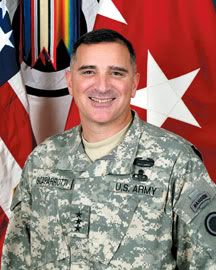All the support coming out of the South Sound directed at Joint Base Lewis-McChord troops in Afghanistan is not going unnoticed, according to Lt. Gen. Curtis M. Scaparrotti, I Corps commanding general.
During a video teleconference from Afghanistan Oct. 20, Scaparrotti praised all the support back home.
"We appreciate the support back in Washington (state) for our Soldiers and Servicemembers ... and the packages," Scaparrotti told Tacoma-area media gathered at Joint Base Lewis-McChord. "We appreciate our families who take care of Soldiers deployed, they care about them and let them know that."
 He emphasized that the support helps troops do their jobs and remain focused.
He emphasized that the support helps troops do their jobs and remain focused.
In June, Scaparrotti deployed to Afghanistan as commander of the International Security Assistance Force Joint Command (IJC) in support of Operation Enduring Freedom. He assumed responsibility for the day-to-day planning and operation of coalition efforts in Afghanistan, which included forming partnerships with Afghan forces to stabilize and reestablish the area. The underlying objective: to implement a democracy that represents and serves Afghans.
Hence, since the 2009-10 surge Afghans now vote in local elections, participate in government, and have made significant gains in basic services and infrastructure. Scaparrotti said there are 13,000 schools and eight million students - of that number 3.2 million are girls, compared to 2001 when there were less than 1,000 schools and 1 million students, few of them girls.
Today, 300,000 Afghan National Security Forces are taking the lead, conducting operations, and with coalition support, denying insurgent safe havens and freedom of movement - violent insurgent attacks are down 16 to 23 percent compared to the same time last year, according to the general.
Nearly 85 percent of the population has access to healthcare within an hour of their homes, he said.
There is normalcy of life and locals are appreciative of the difference, said Scaparrotti.
 "They welcome a chance to contribute ... and are increasingly taking responsibility for both security and governance," he said, adding that he had tea with elders in an area that was a combat zone 18 months prior.
"They welcome a chance to contribute ... and are increasingly taking responsibility for both security and governance," he said, adding that he had tea with elders in an area that was a combat zone 18 months prior.
"I had no gear, no protective vest (as I walked down that same road)," he said.
Scaparrotti said troop morale was good because they knew the mission was important and saw how their expertise and skills were making a difference.
"We are adaptive and creative and make it a tough fight (because) of smart forces," he said.
There are still many challenges ahead and Afghanistan is a complex environment, but IJC remains full engaged in securing the region.
"It's strategic, it's important, it's right," said Scaparrotti.
He compared the situation in Afghanistan to what people in Libya are currently going through.
"All peoples desire a form of representative government, that's what the Afghans want here," he said. "They want representation, security and some form of justice."



Read Comments